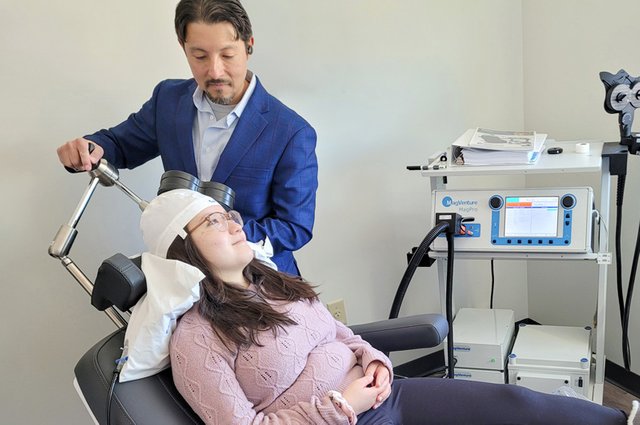The Impact of TMS Therapy on Mental Wellness

The use of Transcranial Magnetic Stimulation (TMS) as a potential therapy for mental wellness is a relatively new but growing field. TMS is a non-invasive method of stimulating the brain through magnetic pulses, and it has been proposed that it may be beneficial in treating conditions such as depression, anxiety, OCD, and other mental health issues. This article explores the potential benefits of TMS therapy, how it works, and any side effects that may occur. It will also examine the implications of using TMS therapy for mental wellness and discuss strategies for further research in this area. Finally, it will discuss potential future directions for research in this area.
Exploring the benefits of TMS therapy for mental wellness
Transcranial Magnetic Stimulation (TMS) is a rapidly growing field of potential therapy for mental wellness. TMS is a non-invasive method of stimulating the brain through magnetic pulses, and it has been proposed that it may be beneficial in treating conditions such as depression, anxiety, OCD, and other mental health issues. While research into the therapeutic use of TMS is still ongoing, there are already many potential benefits to using this form of treatment for mental wellness.
First and foremost, TMS therapy has been shown to reduce symptoms of depression, anxiety, and stress in individuals with these conditions. It can also be used to treat conditions such as bipolar disorder and obsessive-compulsive disorder. This makes it an attractive option for those seeking relief from their mental health issues without having to rely on medications or hospital visits.
TMS therapy in programs like Peachtree Wellness Solutions’ Atlanta Mental Health program offers a safe and effective treatment with minimal side effects. The magnetic pulses used in TMS are gentle enough that they do not cause any pain or discomfort during treatment sessions - making them an appealing alternative to more invasive treatments like electroconvulsive therapy (ECT). In addition, there have been no reports of serious side effects associated with the use of TMS therapy for mental wellness.
How TMS therapy works
TMS therapy is a type of non-invasive brain stimulation that is used to improve mental wellness. The therapy uses a device called a coil, which is placed against the head and delivers magnetic pulses. These magnetic pulses create an electric field in the brain, which helps to stimulate areas of the brain responsible for mental well-being. The effects of this stimulation can vary depending on individual needs but can include reducing symptoms of depression, anxiety, stress, and other conditions.
The duration of TMS treatments typically ranges from 4-6 weeks, with daily sessions lasting between 20-60 minutes each. During these sessions, the patient will sit in a comfortable chair while wearing headphones playing calming music or noises to help them relax during treatment. It’s important to note that most patients experience minimal side effects during treatment such as headaches or discomfort at the site of the coil placement.
Research has shown that TMS therapy can provide long-term relief from mental health issues when administered regularly over time. A study by O’Reardon et al. (2007) found that after 6 months of TMS therapy treatment, 66% of patients reported reduced symptoms and 37% reported complete remission from depression. It was also found that some participants experienced benefits up to 12 months after their initial treatment session.
These findings suggest that TMS therapy from programs like Atlanta Integrative Psychiatry’s TMS Therapy Atlanta may be an effective tool for improving mental wellness over both short and long-term periods. However, more research is needed to determine its efficacy in comparison with traditional therapies such as medications or psychotherapy - as well as its potential implications for individuals seeking relief from mental health issues. With this in mind, further research into TMS therapy could lead to improved treatments for those struggling with mental health issues and a better understanding of how it works to improve mental wellness overall.
Side effects of TMS therapy
TMS therapy is generally considered safe and non-invasive, but there are still some potential side effects to consider. The most common side effect of TMS therapy is temporary discomfort or pain at the site of stimulation. This usually lasts a few minutes and can be addressed by lowering the intensity of the magnetic pulses delivered during treatment. Other potential side effects include headaches, dizziness, lightheadedness, anxiety, depression, and rarely, seizures.
It's important to speak with your doctor about any potential side effects before undergoing TMS therapy. It's also important to note that the long-term effects of TMS therapy are not yet fully understood, and more research is needed in this area. Additionally, while it has been found to be effective for some people with mental health issues such as depression or anxiety, it may not be suitable for everyone and should only be used in conjunction with other treatments such as psychotherapy or medications when recommended by a doctor.
To wrap this up, it's important to remember that everyone responds differently to TMS therapy, so it may take several sessions to find the right combination of parameters tailored specifically for each individual patient in order to achieve optimal results without causing too many adverse side effects.